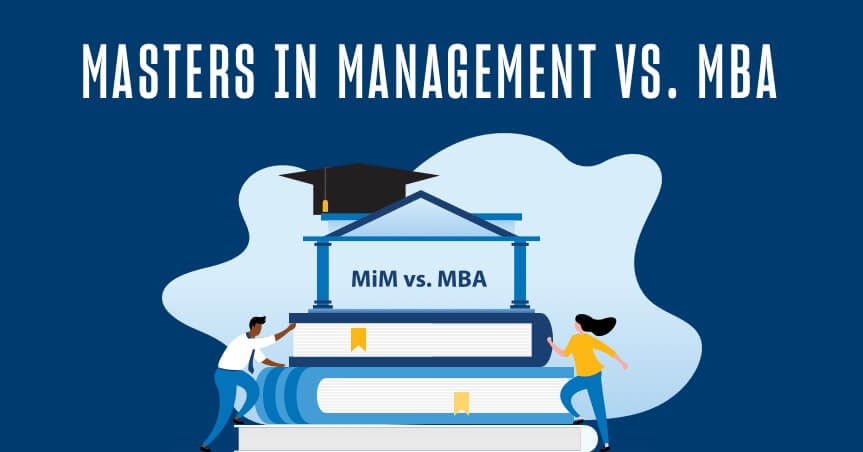Master’s degree programs are powerful tools for those looking to further their career. For a long time the Master of Business Administration (MBA) degree was the go-to choice for those looking to either start their own business or advance within a corporate career.
Today, there are many more specialized degrees that can provide a powerful advantage in developing relevant management skills, learning business best practices and forming valuable professional relationships. The University of San Diego’s Master of Science in Innovation, Technology and Entrepreneurship degree is one such program designed for those innovators looking to make their mark in today’s highly connected world.
So, whether you’re an “intrapreneur” driven to excel within a company or an aspiring entrepreneur looking to start your own venture, it’s important to closely consider which degree would best align with your aspirations. Let’s compare.
Get Your Guide: The 4 Ways to Break Into a Tech Career (Plus 8 Lucrative Tech Careers to Pursue)
What Is an MBA Degree?
A Master of Business Administration (MBA) is an internationally recognized degree designed to develop the skills required for professional careers in business and management. MBA courses are intended to teach the essentials of business with courses relating to statistics, marketing, economics, communications, accounting, finance and management.
While many programs will have a fairly wide variety of class selection and electives, certain MBA degree programs can specialize in areas of finance, marketing, IT or entrepreneurship, offering a more focused line of study. While there are many variations of MBA programs, most will fall into one of the three following categories:
- Full-time MBAs – An intensive and structured program that generally requires 36 credit hours, which takes about two years – though some can last for three and other accelerated programs can be completed in less time. Students in full-time programs are usually expected to study on campus, so expenses can be over $100,000 when accounting for additional costs such as housing and fees.
- Part-time MBAs – Shorter programs designed to take less time to complete than full-time programs, ranging from 12–20 months. They’re offered either as fully online or hybrid online/offline degrees, allowing for greater flexibility in how and when students can take the required courses. They tend to be less expensive than full-time programs due to fewer credit hours and not requiring on-campus expenses.
- Executive MBAs – These programs are largely part-time as they’re specifically designed for working professionals who are, or have been, in executive or leadership roles. Course material is less about teaching concepts and more about engaging with examples, challenging students to work through actual problems experienced by real companies. EMBA programs tend to be a little more expensive on average than other part-time MBA programs, with costs around $55,000 and top schools ranging around $133,000.
While there’s generally no required work experience to be accepted into an MBA program, they will require a bachelor’s degree. Top-rated schools will require a high GPA as well as high test scores from the Graduate Management Admission Test (GMAT). EMBA programs will usually waive education requirements in place of extensive work experience.
MBAs are the most popular master’s degrees. According to the National Center for Education, a reported 197,089 students earned an MBA in the 2018-2019 academic year – the most out of any area of study. This is for good reason, as many high-level positions require candidates to possess an MBA degree in order to apply.
What Is the MITE degree?
The Master of Science in Innovation, Technology and Entrepreneurship (MITE) degree is designed for those seeking new market opportunities or leadership roles in technology or technology-adjacent fields. The MITE degree program is led by University of San Diego’s Shiley-Marcos School of Engineering with expert industry instructors from both the School of Engineering and the Knauss School of Business.
This cross-functional training is intended to help students develop leadership skills in key business areas including marketing, product management, human resources and team-building, by addressing the relationship between technical innovation, entrepreneurship and the connectivity vertical.
Connectivity, or the “technology connectivity” curriculum is a critical look at the emerging opportunities within and made possible by computer and communications platforms. Specifically, the connections enabled from people or machines to information, including:
- People-to-people connections
- People-to-machine connections
- Machine-to-machine connections
- And any other possible variation
In examining entrepreneurship, the MITE curriculum offers in-depth engagement in matters related to product and business development, venture financing, managing entrepreneurial environments and the relationship of technology to product/market fit. However, it places less emphasis on traditional finance and economics coursework; and therefore is less likely to be the ideal program for aspiring chief financial officers, accountants or bankers.
Finally in regards to innovation, this degree is a great fit for technology industry professionals who are looking for an in-depth understanding of fundamental and advanced business models, concepts and practices. The program is also tailor-made for current and aspiring entrepreneurs who are:
- Interested in navigating the world of computer and communications platforms driving connectivity
- Excited to challenge conventional thinking through innovation
- Willing and able to think in first principles
- Driven to create value for others
- Determined to take the initiative to make it happen
Get Your Guide: The 4 Ways to Break Into a Tech Career (Plus 8 Lucrative Tech Careers to Pursue)
Career Outlook for MBA Graduates
There is always a market for graduates with experience in business and financial administration. While there are a wide range of career possibilities for those with MBA degrees, the following tend to be four of the more popular and highest paying*:
- Sales Director – $101k
Responsible for managing and overseeing the sales operations of an organization, with main duties that include meeting sales targets, cultivating client relationships and evaluating costs and market value to determine product pricing. Sales directors accomplish this by conducting market research, analyzing sales reports, and training sales representatives and managers. - Financial Manager – $95k
Their main responsibility is to build financial strategies and develop reports to improve the financial health of a company and ensure that revenue target goals can be met. Financial managers work to create financial forecasts, manage the budget, find ways to reduce financial risk and to stabilize or reduce costs. This position requires knowledge of legal and regulatory requirements in finance, especially for tax purposes. - Management Consultant – $90k
These are external consultants who are hired to review an organization’s overall efficiency and then make recommendations to improve revenue and reduce costs. They analyze financial and performance data, conduct interviews with personnel, determine new solutions or procedures and then make recommendations to management. Consultants can specialize in certain industries like manufacturing or health care, or in specific areas like information technology or human resources. - Investment Banker – $101k
Investment bankers help companies, governments and other organizations raise capital to grow. They raise capital by advising the organization on how to issue stock or borrow money. They often work for financial institutions and will serve as intermediaries for buying and selling capital as well as overseeing mergers and acquisitions. Aspiring investment bankers are also typically required to pass a licensing exam.
Career Outlook for MITE Graduates
- Technology / Business Innovation Consultant – $80k
These consultants collaborate with businesses to identify problems, review processes and develop strategies to improve efficiencies. They analyze data and interview personnel to help an organization explore how to shift priorities, introduce new initiatives and better meet the needs and wants of their clients. Tech consultants specialize in analyzing an organization’s technological capacity and identifying areas for improvement and growth. - CTO / CIO / IT Director – $164k
Depending on the size or structure of an organization, the roles and responsibilities of CTOs, CIOs and IT directors could be split, shared or combined. No matter the specific title, these positions are responsible for making the highest-level executive decisions with regard to the technological interests of a company. It could be inward-focused to outline the company’s technological vision, outward-focused in order to align a company’s development with partners and clients, or a mixture of both. - Business Unit Manager / Product Line Manager – $109k
Business unit and product line managers work as a “mini CEO” for a product line. It’s their responsibility to define a road map for their product, determine the value proposition and communicate that information with the rest of the company. For example, they’ll need to articulate what is most important about the product and needs to be emphasized with the engineers in development. They’ll also work with financing to determine the most lucrative pricing that the market will bear. - Startup Founder / CEO – $160k+
Chief executive officers (CEOs) and startup founders are responsible for everything within a company, including but not limited to operations, marketing, strategy, financing, creation of company culture, human resources, sales and public relations. They manage all other C-suite positions and ensure that all departments are optimized, on track and working toward the company’s vision and goals.
*All salaries were sourced in February 2022 from Payscale and should be considered estimates.
MITE and MBA Comparison Table
| MITE | MBA | |
| Degree Goals | Develop business management skills and complementary technical knowledge. Build up skills to more effectively determine product market fit for innovations within the technology space. | Gain leadership training by building skills in financing, personnel management, communication and marketing. Build up credentials to improve chances of advancing within a corporate career. |
| Curriculum |
|
|
| Popular Careers |
|
|
| Estimated Average Pay | Estimated to be between $87k –$200k based on career outlook. | Average compensation for MBA grads is estimated to be between $52,338 and $172,265. |
| Preferred Prior Courses |
|
|
| Average Program Cost |
|
|
Get Your Guide: The 4 Ways to Break Into a Tech Career (Plus 8 Lucrative Tech Careers to Pursue)
How to Decide Which Degree is Right for You?
The Master of Business Administration degree is a solid choice for those looking to start their professional business career at a higher level, make a career change into another profession with a business focus such as finance or marketing, or advance within their chosen corporate career.
The MBA is purely a business degree and is usually the degree of choice for those interested in climbing the corporate ladder. While it is helpful for learning more specialized knowledge – such as financing or product management – a significant part of its values comes from being able to establish connections to a program’s alumni network.
The MITE degree, in comparison, is a one-of-a-kind, cross-functional degree program that engages participants in building technology leadership skills and developing high-level knowledge and insights into tech business success. It is taught by deeply experienced instructors from the worlds of both business and engineering. This line of study is not about small business management, but is more focused on areas related to tech startup opportunities – such as identifying innovation opportunities and securing venture capital.
Like some MBA programs, the MITE program provides students with access to networks and connections, though mainly within technology product development, tech innovation, venture capital and angel investing. This degree is tailor made for professionals interested in joining tech startups, seeking to innovate new initiatives as an intrapreneur or starting a career as an entrepreneur in a technology-related field.
If you are interested in learning more about what the MITE program has to offer, contact an advisor and take the next step in your career.




